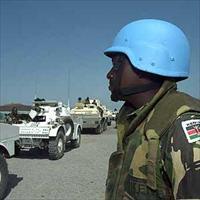LIBERIA: Peacekeeper pull-out will be “cautious and gradual”

“As you know the UN peacekeeping mission (UNMIL) has
begun the first phase of the draw down process. I wish to assure you that this
draw down will proceed in a cautious and gradual manner that will not put at
risk the gains that have been reached so far,” Ban said.
“The gradual withdrawal should allow the government
sufficient time to assume full responsibility for the nation’s security,” he
added.
UN peacekeepers have been on the ground in Liberia since
September 2003. The Security Council authorised the establishment of UNMIL at
the height of a civil war which had been ongoing in Liberia for 13 years.
In September 2006, the UN Secretary General recommended
in a report to the Security Council that critical benchmarks on security,
governance, the rule of law, economic revitalisation, and infrastructure and
basic services should be met before the mission pulled out.
“The security benchmarks, including the training and
deployment of the Armed Forces of Liberia and Liberian National Police,
development by the government of a national security strategy and architecture,
reintegration of ex-combatants and return and reintegration of refugees, are
critical in determining the pace and timing of the drawdown and eventual
withdrawal of the Mission,”
the report outlined.
Ban said the Security Council is expected to review the
implementation of those benchmarks in September 2008. The withdrawal of
peacekeepers is expected to be finished by 2010, one year before Liberia is
scheduled to hold its second post-war presidential elections.
Ban’s Special Representative in Liberia, Ellen
Margrethe Loj, recently warned the UN Security Council that the country still
faces some crucial challenges. “The hope and tranquillity we see today is
tempered by a tenuous and fragile peace,” she said on 14 April, pointing to the
UN police and military forces as still being key to stability.
“More progress is needed in reforming the legal and
judicial systems and in extending the rule of law through out the country. More
needs to be done in reintegrating populations affected by war and promoting
reconciliation and national unity,” Ban said.
Efforts are ongoing for the rebuilding of Liberia’s new national army, but Liberian
defence officials have told IRIN that they are “not certain” when a new
2,000-troop army being trained by the United States would be operational.
Mob violence is on the rise in some parts of the
country, notably the rubber plantations and diamond mining areas, according to
the UN. “Such incidents highlight the need for security sector reform in the
country,” noted Loj in her 14 April report to the Security Council.
Many parts of Monrovia
are no-go areas after dark. Some Liberians have expressed concerns about the
planned UN pull-out.
Steve Nimely, a university lecturer, said it is “too
early” for peacekeepers to scale down. “Liberia is still fragile. The
police can not fight crimes and the army is not ready now to defend this
country as they are still undergoing training. At least UNMIL must be the
ground two years after our next elections,” he told IRIN.
 Back and Next - Back and Next
Back and Next - Back and Next See Also - See Also
See Also - See Also